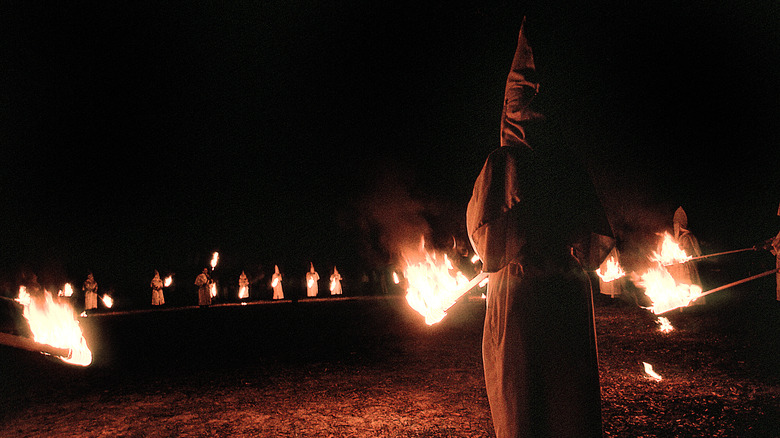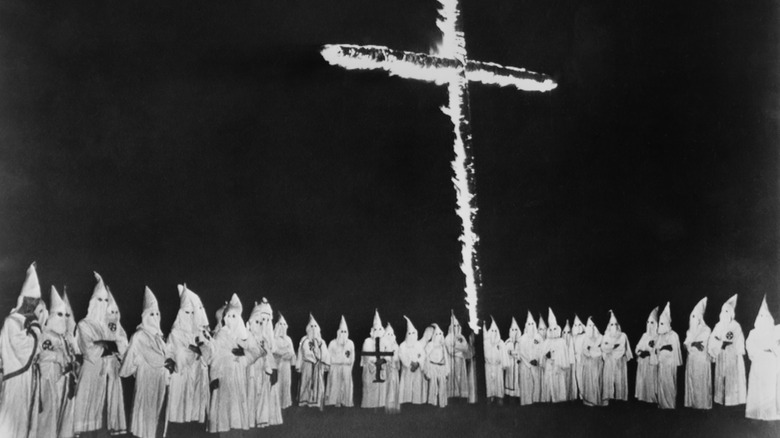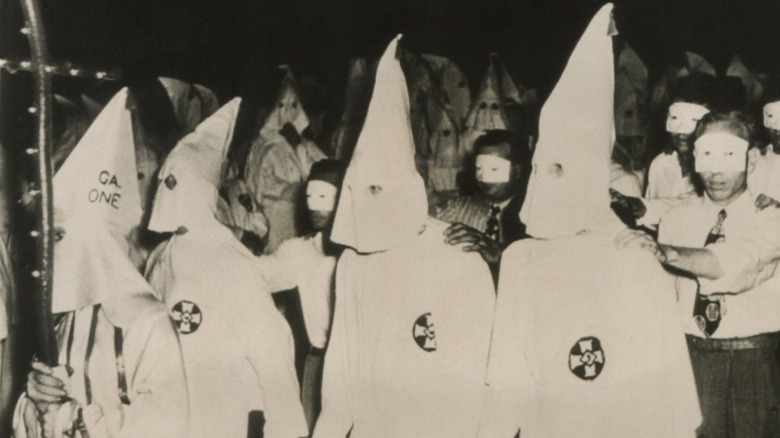The Tragic Story Of The Kirk-Holden War
In 1870, much of the American South was having trouble coming to terms with how the Civil War ended. One particular group of sore losers was — you guessed it — the Ku Klux Klan. They didn't like Reconstruction era policies that aimed to finally get the United States to practice what it preached with regards to the whole "All men are created equal" business. As History.com notes, the KKK had been active for five years, menacing communities all over the South with violence, intimidation, vandalism, and other forms of terrorism to get what it wanted. And what the KKK in North Carolina wanted was a governor who would tolerate its terrible behavior and beliefs, rather than stand up for equality and other patriotic ideals.
According to the official Caswell County website, members of the KKK in Alamance County lynched 50-year-old Wyatt Outlaw, a freed slave who was serving as a local town councilman and constable, on February 26. While there were rumors that he had shot at some Klansmen a few days earlier, historians tend to agree that the murder was politically motivated. Simply put, Outlaw was a Black man in a position of power. The Klan didn't like that. So they hung him from an elm tree outside the county courthouse. But Outlaw wasn't the only one who paid a terrible price for the Klan's racist politics that year.
The Ku Klux Klan murdered a state senator in the county courthouse
The violence of the KKK in North Carolina in 1870 was reaching extremes and crossing racial lines to affect anyone who stood opposed to the group's goals. According to the Caswell County Historical Association, one of those people was State Senator John W. Stephens. To put it mildly, lots of white folks in Caswell County were not fans of Stephens, thanks to his political organization of the Black residents of the county and his position as an agent in the Freemen's Bureau, a Reconstruction era agency that provided government assistance to freed slaves and poor white people in the South. He was made a pariah in the white community, kicked out of the local Methodist Church, and accused of various crimes, including burning crops and property and even the murder of his own mother.
John G. Lea, the leader of the local KKK group that ended up murdering Stephens on May 21, 1870, confessed to the crime in a written statement for the North Carolina Historical Commission, but only on the cowardly condition that the document remain sealed until after he died. In his confession, he claimed that the KKK had given Stephens a "fair trial before a jury of twelve men," then they lured him into a storage room in the county courthouse and strangled and stabbed him to death. After this and the violence in Alamance County, Governor William W. Holden decided it was time to take action.
Governor Holden went after the KKK and paid a hefty price
Governor Holden was a man who believed in the Reconstruction. According to Reuters, he said as much at his inauguration on July 4, 1868. So when he saw the KKK responding so violently to the policies of reform, he took decisive action. He declared martial law in Alamance and Caswell Counties, suspended the writ of habeas corpus — out of fears of sympathetic judges letting KKK members off the hook — and gave Colonel George W. Kirk the task of restoring order. Kirk arrested around 100 men in what is now called the Kirk-Holden War.
But Holden soon paid a steep political price for his actions. After the pro-Confederacy democrats gained control of the state legislature soon thereafter, they impeached him on eight charges. He became the first governor in U.S. history to be removed by impeachment. As the Asheville Citizen-Times reported in 2011, the North Carolina state legislature gave Holden a posthumous "pardon" for having done his job, something the man himself actually rejected in life on the grounds that he needed no pardon because he'd done nothing wrong. Still, modern lawmakers saw fit to do so. "He definitely warrants a pardon," said Republican State Senator Neal Hunt, one of the primary sponsors of the resolution. "He was standing up for what is right."


